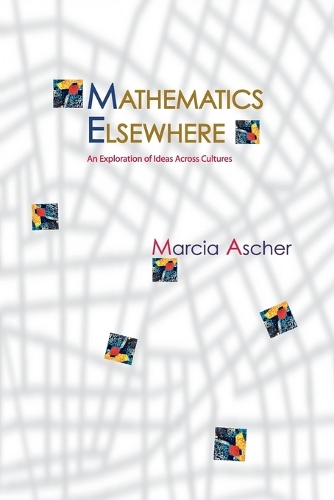
Mathematics Elsewhere: An Exploration of Ideas Across Cultures
(Paperback)
Publishing Details
Mathematics Elsewhere: An Exploration of Ideas Across Cultures
By (Author) Marcia Ascher
Princeton University Press
Princeton University Press
17th January 2005
United States
Classifications
Professional and Scholarly
Non Fiction
510
Commended for AAP/Professional and Scholarly Publishing Awards: Mathematics and Statistics 2003
Physical Properties
Paperback
224
Width 152mm, Height 235mm
312g
Description
Mathematics Elsewhere is a fascinating and important contribution to a global view of mathematics. Presenting mathematical ideas of peoples from a variety of small-scale and traditional cultures, it humanizes our view of mathematics and expands our conception of what is mathematical. Through engaging examples of how particular societies structure time, reach decisions about the future, make models and maps, systematize relationships, and create intriguing figures, Marcia Ascher demonstrates that traditional cultures have mathematical ideas that are far more substantial and sophisticated than is generally acknowledged.
Reviews
Honorable Mention for the 2003 Award for Best Professional/Scholarly Book in Mathematics and Statistics, Association of American Publishers "A useful reminder of how universal mathematical and logical structures are in any culture. Mathematicians will enjoy seeing the subject they love cropping up in apparently unexpected contexts. Non-mathematicians should be encouraged to realize that some of the processes that seem to appear naturally in everyday life do in fact have a mathematical content."--John O'Connor, Nature "For a mathematician, Mathematics Elsewhere will expand the universe; for a non-mathematician, the expansion will just take a little more time. The book succeeds well in presenting and explaining very different ways of doing math both within particular cultural contexts and in terms of modern mathematics... The author is clearly an excellent teacher and a wonderful explainer. Every time I felt a bit lost, the next sequence would present the same concept in different words or with another example. She is adept at moving from the general to the specific, from narrative to figurative."--Helaine Selin, Science "This interesting book is a fundamental work in the area of ethnomathematics... [T]he author opens numerous doors and directions in which one finds interesting, nontrivial mathematics. Persons interested in investigating the mathematics of non-Western cultures can use this book as a motivation to look beyond the obvious."--Thomas E. Golsdorf, Mathematical Reviews "Ascher illustrates that non-Western cultures have developed sophisticated mathematical ideas often without having any formal concept of mathematics. This stimulating book deserves a wide audience, especially among those involved in teaching the subject."--Andrew Bowler, New Scientist "In a follow-up to Ascher's highly recommended Ethnomathematics, this scholarly work describes the anthropology of mathematical ideas in traditional societies and shows how the same ideas might be expressed by standard mathematical expressions... It is particularly interesting to see how people with no separate mathematical language made practical use of sophisticated mathematical ideas."--Library Journal "All throughout the book, I was struck by how many uses human cultures have found for modular arithmetic... [I]t appears that mathematics may be an essential survival skill for the human species rather than an extraneous one. The descriptions in this book describe so many different applications, that it becomes hard to deny that something more fundamental is responsible for the many ways we find to person mathematical operations."--Charles Ashbacher, MAA Online "Ascher's spendid book is rich in possibilities for raising readers' horizons: anthropological, educational, mathematical, and philosophical."--Philip J. Davis, SIAM News "Ascher's book is at once a scholarly progress report and an introduction for the curious general reader to a relatively new area of study known as ethnomathematics... Ascher offers a new way of understanding the customs and traditions of non-Western people, adding the lens of mathematics to those of literature, anthropology, and sociology... [She] proves adept at illuminating the connections between local and global mathematics... Part of what makes the volume accessible to the general reader ... is Ascher's evident love for her subject. The mathematics she includes clearly serves a larger purpose: to enhance and illuminate the anecdotes that are the foundation of genuine cultural understanding."--James V. Rauff, Natural History
Author Bio
Marcia Ascher is Professor Emerita of Mathematics at Ithaca College. She is the coauthor of "Code of the Quipu: A Study in Media, Mathematics, and Culture" and the author of "Ethnomathematics: A Multicultural View of Mathematical Ideas".
